Analysis of E-commerce Development in Negara Brunei Darussalam
VerifiedAdded on 2021/04/19
|26
|7517
|413
Report
AI Summary
This report explores the development of e-commerce in Negara Brunei Darussalam and its potential to diversify the country's economy. It examines the current IT infrastructure, security concerns, and the role of SMEs in e-commerce adoption through a questionnaire survey of 100 respondents. The research identifies challenges such as a lack of trust in online transactions, inadequate participation of SMEs, and insufficient security measures against financial fraud. The report suggests that collaboration between e-commerce companies and the government is crucial for improving IT infrastructure, enhancing security, and fostering trust among consumers. Additionally, the government needs to invest in telecommunications infrastructure to provide affordable and fast internet access, facilitating the digitalization of the economy and promoting e-commerce growth in Brunei Darussalam. The study emphasizes the importance of addressing these issues to unlock the full potential of e-commerce and drive economic development in the country.
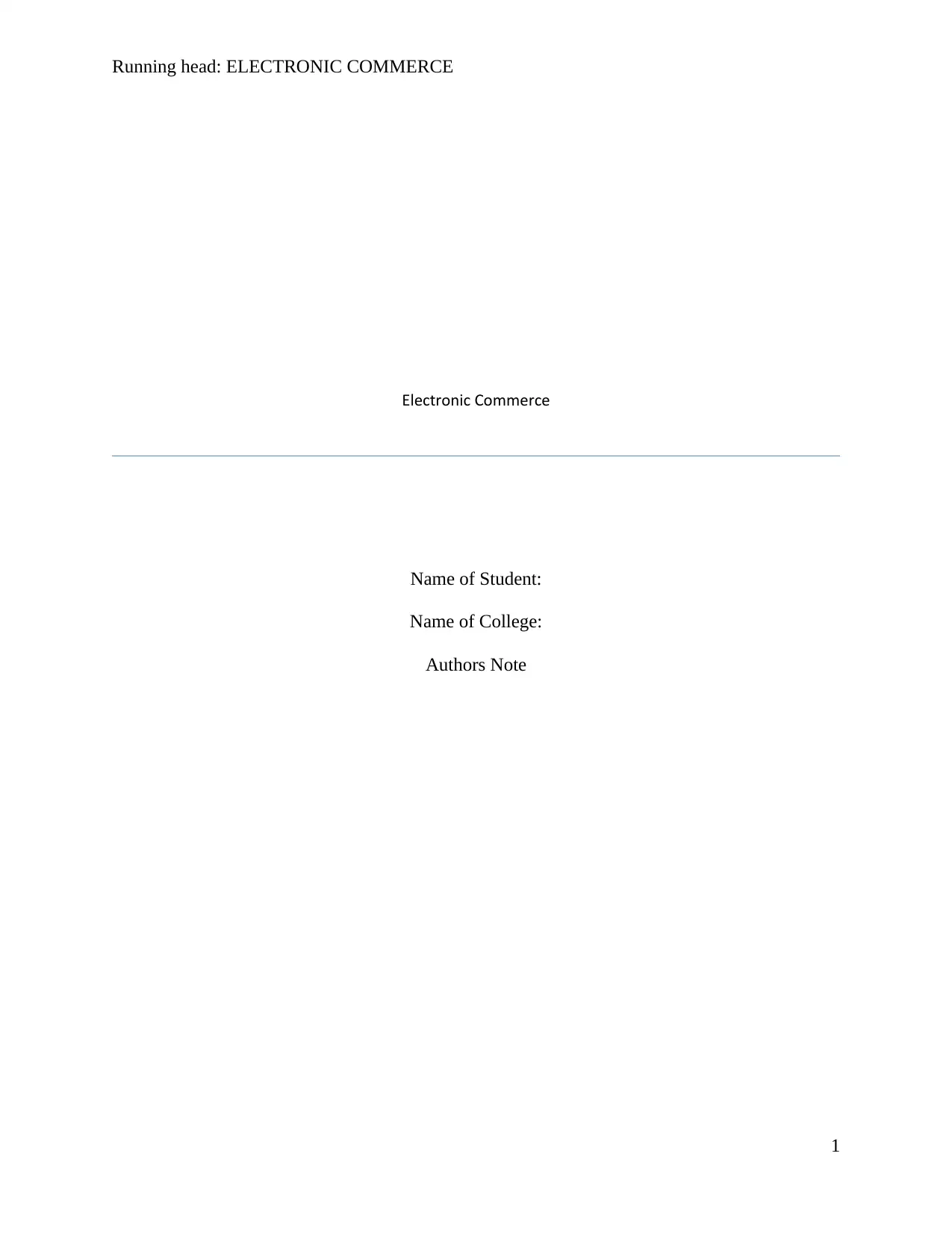
Running head: ELECTRONIC COMMERCE
Electronic Commerce
Name of Student:
Name of College:
Authors Note
1
Electronic Commerce
Name of Student:
Name of College:
Authors Note
1
Paraphrase This Document
Need a fresh take? Get an instant paraphrase of this document with our AI Paraphraser
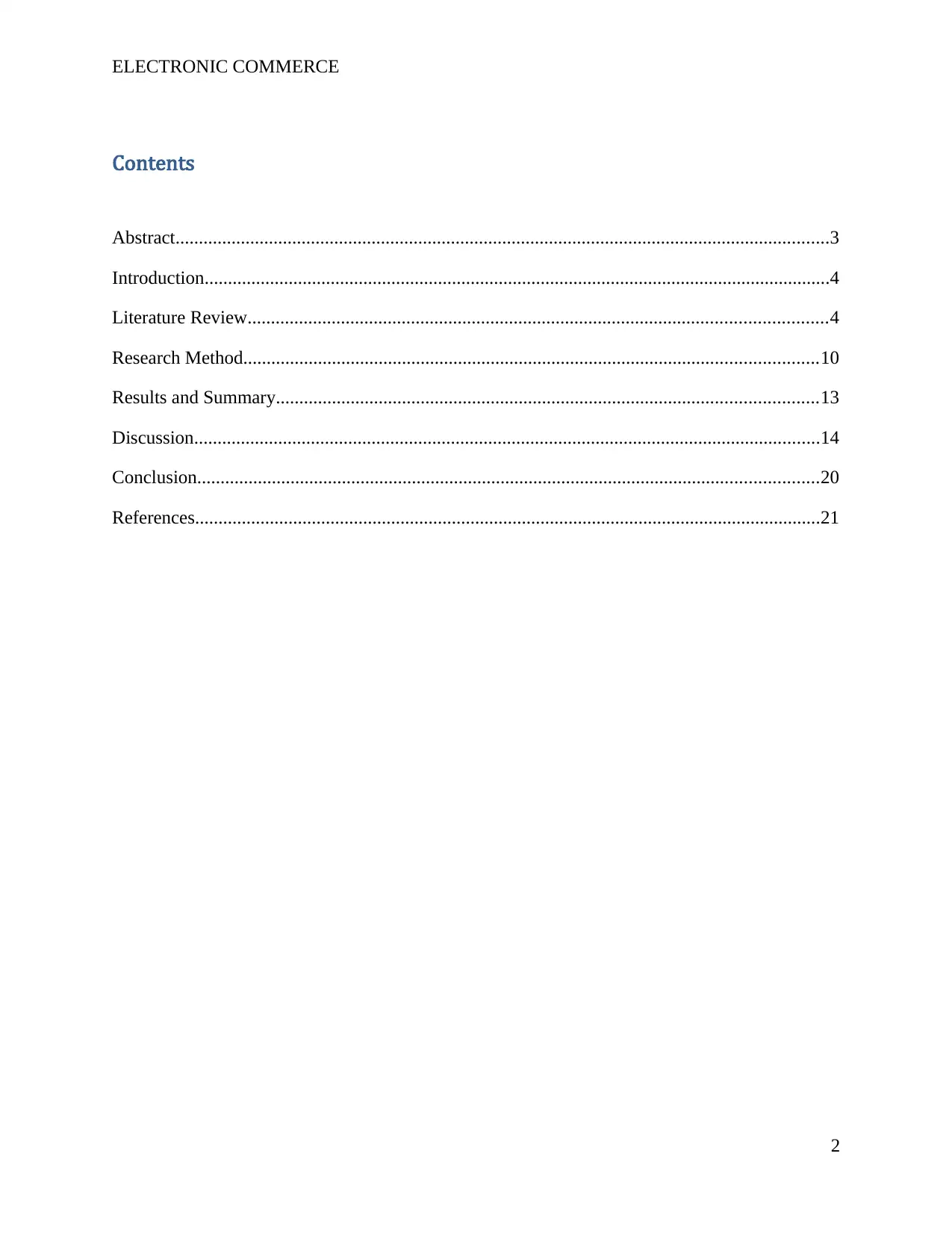
ELECTRONIC COMMERCE
Contents
Abstract............................................................................................................................................3
Introduction......................................................................................................................................4
Literature Review............................................................................................................................4
Research Method...........................................................................................................................10
Results and Summary....................................................................................................................13
Discussion......................................................................................................................................14
Conclusion.....................................................................................................................................20
References......................................................................................................................................21
2
Contents
Abstract............................................................................................................................................3
Introduction......................................................................................................................................4
Literature Review............................................................................................................................4
Research Method...........................................................................................................................10
Results and Summary....................................................................................................................13
Discussion......................................................................................................................................14
Conclusion.....................................................................................................................................20
References......................................................................................................................................21
2
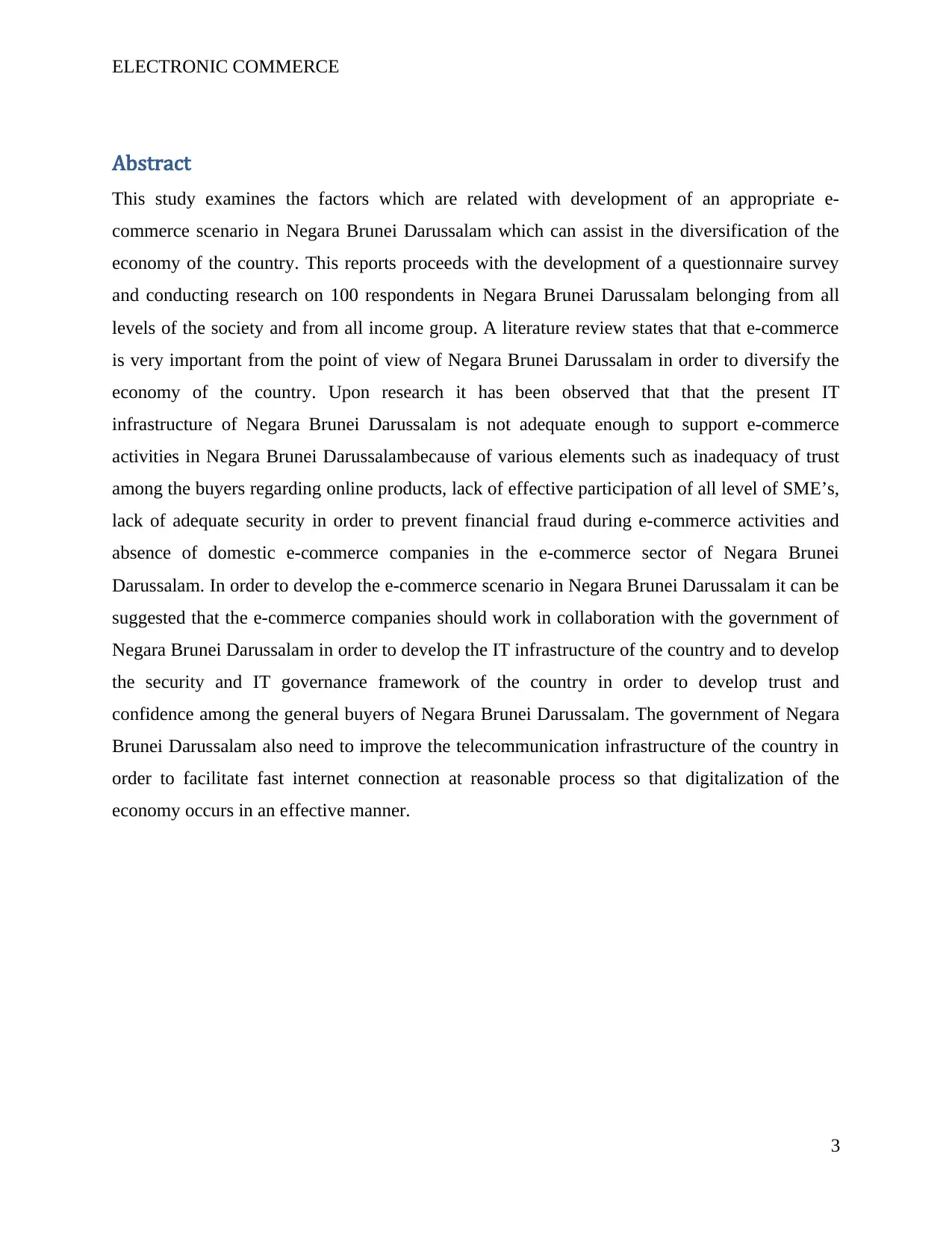
ELECTRONIC COMMERCE
Abstract
This study examines the factors which are related with development of an appropriate e-
commerce scenario in Negara Brunei Darussalam which can assist in the diversification of the
economy of the country. This reports proceeds with the development of a questionnaire survey
and conducting research on 100 respondents in Negara Brunei Darussalam belonging from all
levels of the society and from all income group. A literature review states that that e-commerce
is very important from the point of view of Negara Brunei Darussalam in order to diversify the
economy of the country. Upon research it has been observed that that the present IT
infrastructure of Negara Brunei Darussalam is not adequate enough to support e-commerce
activities in Negara Brunei Darussalambecause of various elements such as inadequacy of trust
among the buyers regarding online products, lack of effective participation of all level of SME’s,
lack of adequate security in order to prevent financial fraud during e-commerce activities and
absence of domestic e-commerce companies in the e-commerce sector of Negara Brunei
Darussalam. In order to develop the e-commerce scenario in Negara Brunei Darussalam it can be
suggested that the e-commerce companies should work in collaboration with the government of
Negara Brunei Darussalam in order to develop the IT infrastructure of the country and to develop
the security and IT governance framework of the country in order to develop trust and
confidence among the general buyers of Negara Brunei Darussalam. The government of Negara
Brunei Darussalam also need to improve the telecommunication infrastructure of the country in
order to facilitate fast internet connection at reasonable process so that digitalization of the
economy occurs in an effective manner.
3
Abstract
This study examines the factors which are related with development of an appropriate e-
commerce scenario in Negara Brunei Darussalam which can assist in the diversification of the
economy of the country. This reports proceeds with the development of a questionnaire survey
and conducting research on 100 respondents in Negara Brunei Darussalam belonging from all
levels of the society and from all income group. A literature review states that that e-commerce
is very important from the point of view of Negara Brunei Darussalam in order to diversify the
economy of the country. Upon research it has been observed that that the present IT
infrastructure of Negara Brunei Darussalam is not adequate enough to support e-commerce
activities in Negara Brunei Darussalambecause of various elements such as inadequacy of trust
among the buyers regarding online products, lack of effective participation of all level of SME’s,
lack of adequate security in order to prevent financial fraud during e-commerce activities and
absence of domestic e-commerce companies in the e-commerce sector of Negara Brunei
Darussalam. In order to develop the e-commerce scenario in Negara Brunei Darussalam it can be
suggested that the e-commerce companies should work in collaboration with the government of
Negara Brunei Darussalam in order to develop the IT infrastructure of the country and to develop
the security and IT governance framework of the country in order to develop trust and
confidence among the general buyers of Negara Brunei Darussalam. The government of Negara
Brunei Darussalam also need to improve the telecommunication infrastructure of the country in
order to facilitate fast internet connection at reasonable process so that digitalization of the
economy occurs in an effective manner.
3
⊘ This is a preview!⊘
Do you want full access?
Subscribe today to unlock all pages.

Trusted by 1+ million students worldwide
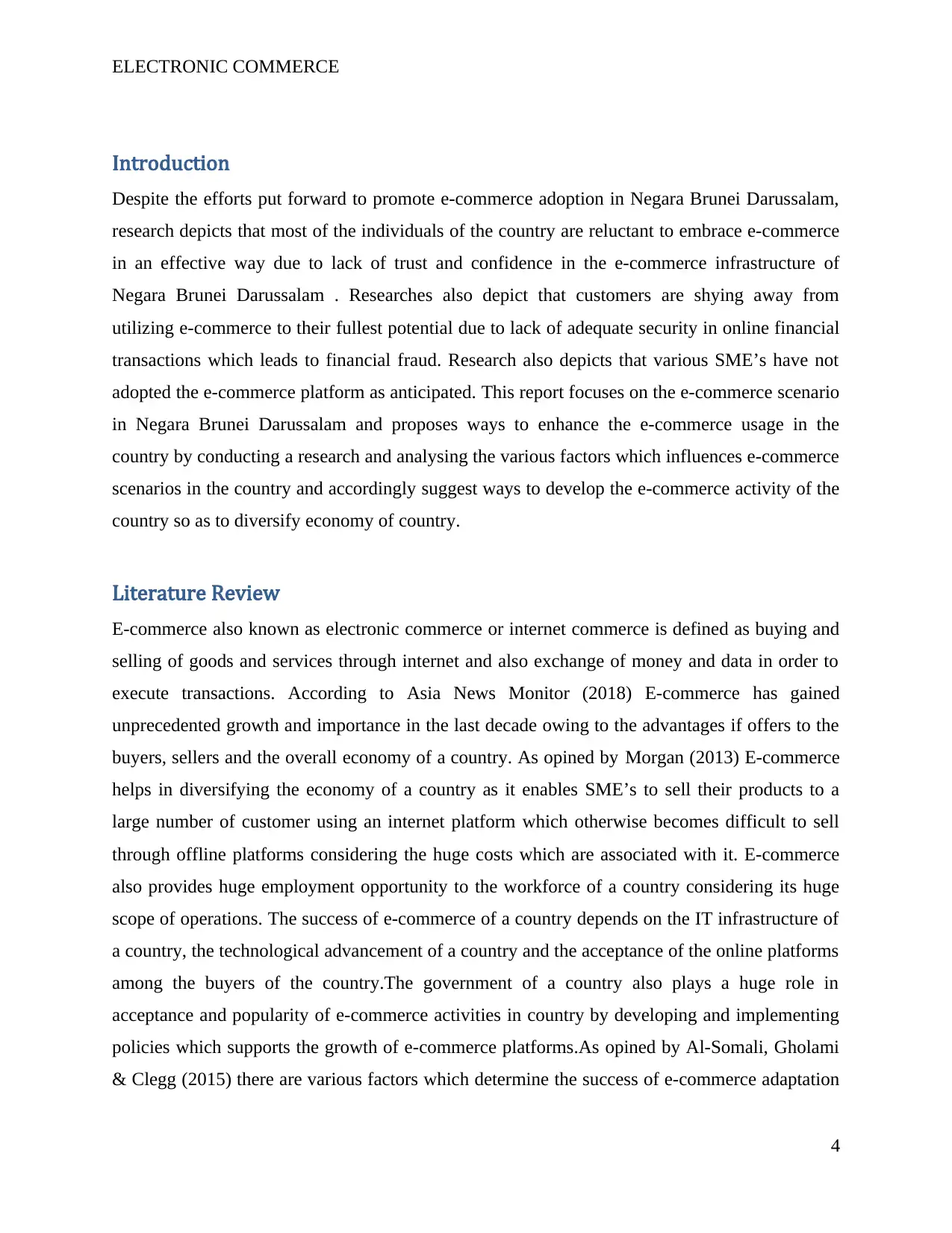
ELECTRONIC COMMERCE
Introduction
Despite the efforts put forward to promote e-commerce adoption in Negara Brunei Darussalam,
research depicts that most of the individuals of the country are reluctant to embrace e-commerce
in an effective way due to lack of trust and confidence in the e-commerce infrastructure of
Negara Brunei Darussalam . Researches also depict that customers are shying away from
utilizing e-commerce to their fullest potential due to lack of adequate security in online financial
transactions which leads to financial fraud. Research also depicts that various SME’s have not
adopted the e-commerce platform as anticipated. This report focuses on the e-commerce scenario
in Negara Brunei Darussalam and proposes ways to enhance the e-commerce usage in the
country by conducting a research and analysing the various factors which influences e-commerce
scenarios in the country and accordingly suggest ways to develop the e-commerce activity of the
country so as to diversify economy of country.
Literature Review
E-commerce also known as electronic commerce or internet commerce is defined as buying and
selling of goods and services through internet and also exchange of money and data in order to
execute transactions. According to Asia News Monitor (2018) E-commerce has gained
unprecedented growth and importance in the last decade owing to the advantages if offers to the
buyers, sellers and the overall economy of a country. As opined by Morgan (2013) E-commerce
helps in diversifying the economy of a country as it enables SME’s to sell their products to a
large number of customer using an internet platform which otherwise becomes difficult to sell
through offline platforms considering the huge costs which are associated with it. E-commerce
also provides huge employment opportunity to the workforce of a country considering its huge
scope of operations. The success of e-commerce of a country depends on the IT infrastructure of
a country, the technological advancement of a country and the acceptance of the online platforms
among the buyers of the country.The government of a country also plays a huge role in
acceptance and popularity of e-commerce activities in country by developing and implementing
policies which supports the growth of e-commerce platforms.As opined by Al-Somali, Gholami
& Clegg (2015) there are various factors which determine the success of e-commerce adaptation
4
Introduction
Despite the efforts put forward to promote e-commerce adoption in Negara Brunei Darussalam,
research depicts that most of the individuals of the country are reluctant to embrace e-commerce
in an effective way due to lack of trust and confidence in the e-commerce infrastructure of
Negara Brunei Darussalam . Researches also depict that customers are shying away from
utilizing e-commerce to their fullest potential due to lack of adequate security in online financial
transactions which leads to financial fraud. Research also depicts that various SME’s have not
adopted the e-commerce platform as anticipated. This report focuses on the e-commerce scenario
in Negara Brunei Darussalam and proposes ways to enhance the e-commerce usage in the
country by conducting a research and analysing the various factors which influences e-commerce
scenarios in the country and accordingly suggest ways to develop the e-commerce activity of the
country so as to diversify economy of country.
Literature Review
E-commerce also known as electronic commerce or internet commerce is defined as buying and
selling of goods and services through internet and also exchange of money and data in order to
execute transactions. According to Asia News Monitor (2018) E-commerce has gained
unprecedented growth and importance in the last decade owing to the advantages if offers to the
buyers, sellers and the overall economy of a country. As opined by Morgan (2013) E-commerce
helps in diversifying the economy of a country as it enables SME’s to sell their products to a
large number of customer using an internet platform which otherwise becomes difficult to sell
through offline platforms considering the huge costs which are associated with it. E-commerce
also provides huge employment opportunity to the workforce of a country considering its huge
scope of operations. The success of e-commerce of a country depends on the IT infrastructure of
a country, the technological advancement of a country and the acceptance of the online platforms
among the buyers of the country.The government of a country also plays a huge role in
acceptance and popularity of e-commerce activities in country by developing and implementing
policies which supports the growth of e-commerce platforms.As opined by Al-Somali, Gholami
& Clegg (2015) there are various factors which determine the success of e-commerce adaptation
4
Paraphrase This Document
Need a fresh take? Get an instant paraphrase of this document with our AI Paraphraser
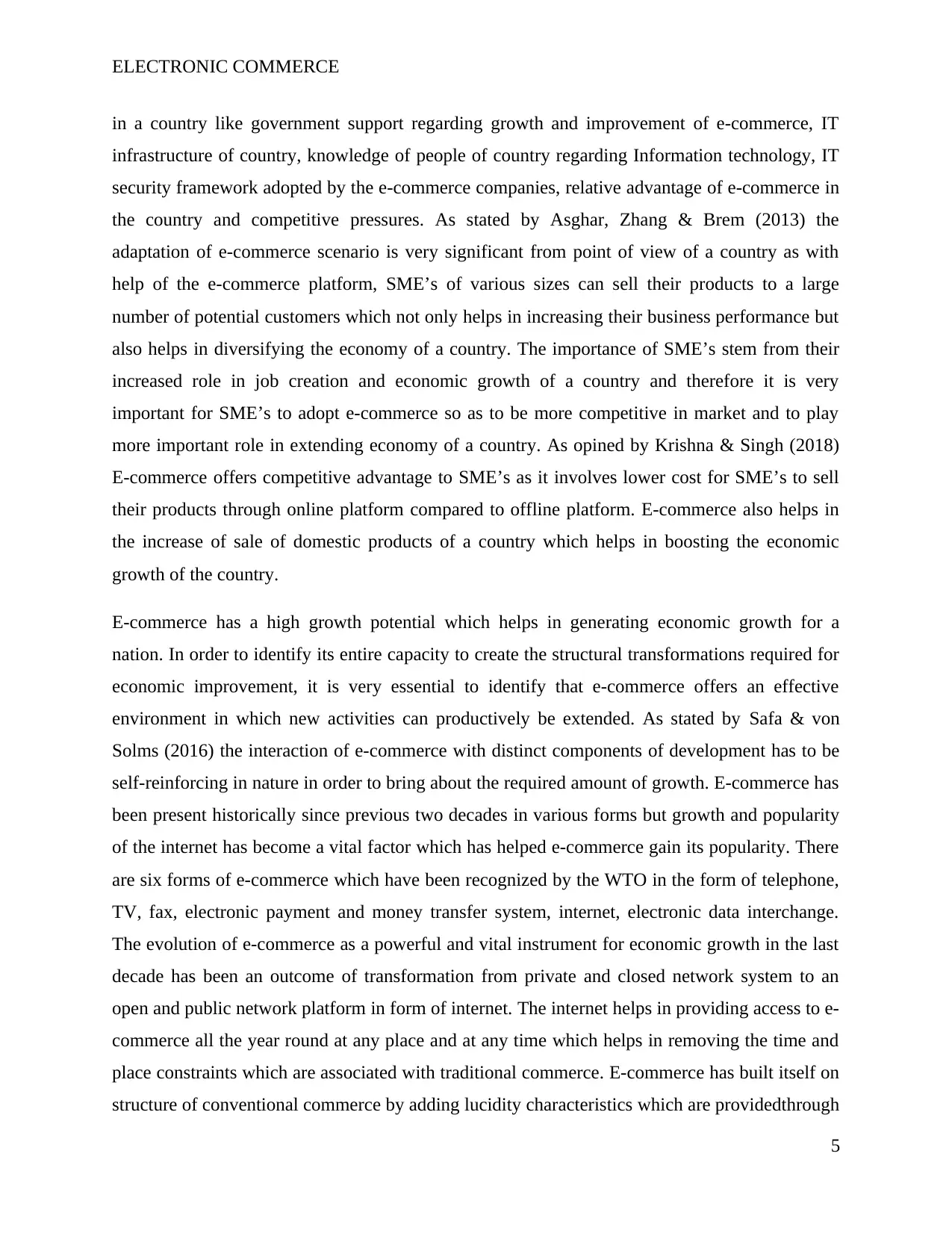
ELECTRONIC COMMERCE
in a country like government support regarding growth and improvement of e-commerce, IT
infrastructure of country, knowledge of people of country regarding Information technology, IT
security framework adopted by the e-commerce companies, relative advantage of e-commerce in
the country and competitive pressures. As stated by Asghar, Zhang & Brem (2013) the
adaptation of e-commerce scenario is very significant from point of view of a country as with
help of the e-commerce platform, SME’s of various sizes can sell their products to a large
number of potential customers which not only helps in increasing their business performance but
also helps in diversifying the economy of a country. The importance of SME’s stem from their
increased role in job creation and economic growth of a country and therefore it is very
important for SME’s to adopt e-commerce so as to be more competitive in market and to play
more important role in extending economy of a country. As opined by Krishna & Singh (2018)
E-commerce offers competitive advantage to SME’s as it involves lower cost for SME’s to sell
their products through online platform compared to offline platform. E-commerce also helps in
the increase of sale of domestic products of a country which helps in boosting the economic
growth of the country.
E-commerce has a high growth potential which helps in generating economic growth for a
nation. In order to identify its entire capacity to create the structural transformations required for
economic improvement, it is very essential to identify that e-commerce offers an effective
environment in which new activities can productively be extended. As stated by Safa & von
Solms (2016) the interaction of e-commerce with distinct components of development has to be
self-reinforcing in nature in order to bring about the required amount of growth. E-commerce has
been present historically since previous two decades in various forms but growth and popularity
of the internet has become a vital factor which has helped e-commerce gain its popularity. There
are six forms of e-commerce which have been recognized by the WTO in the form of telephone,
TV, fax, electronic payment and money transfer system, internet, electronic data interchange.
The evolution of e-commerce as a powerful and vital instrument for economic growth in the last
decade has been an outcome of transformation from private and closed network system to an
open and public network platform in form of internet. The internet helps in providing access to e-
commerce all the year round at any place and at any time which helps in removing the time and
place constraints which are associated with traditional commerce. E-commerce has built itself on
structure of conventional commerce by adding lucidity characteristics which are providedthrough
5
in a country like government support regarding growth and improvement of e-commerce, IT
infrastructure of country, knowledge of people of country regarding Information technology, IT
security framework adopted by the e-commerce companies, relative advantage of e-commerce in
the country and competitive pressures. As stated by Asghar, Zhang & Brem (2013) the
adaptation of e-commerce scenario is very significant from point of view of a country as with
help of the e-commerce platform, SME’s of various sizes can sell their products to a large
number of potential customers which not only helps in increasing their business performance but
also helps in diversifying the economy of a country. The importance of SME’s stem from their
increased role in job creation and economic growth of a country and therefore it is very
important for SME’s to adopt e-commerce so as to be more competitive in market and to play
more important role in extending economy of a country. As opined by Krishna & Singh (2018)
E-commerce offers competitive advantage to SME’s as it involves lower cost for SME’s to sell
their products through online platform compared to offline platform. E-commerce also helps in
the increase of sale of domestic products of a country which helps in boosting the economic
growth of the country.
E-commerce has a high growth potential which helps in generating economic growth for a
nation. In order to identify its entire capacity to create the structural transformations required for
economic improvement, it is very essential to identify that e-commerce offers an effective
environment in which new activities can productively be extended. As stated by Safa & von
Solms (2016) the interaction of e-commerce with distinct components of development has to be
self-reinforcing in nature in order to bring about the required amount of growth. E-commerce has
been present historically since previous two decades in various forms but growth and popularity
of the internet has become a vital factor which has helped e-commerce gain its popularity. There
are six forms of e-commerce which have been recognized by the WTO in the form of telephone,
TV, fax, electronic payment and money transfer system, internet, electronic data interchange.
The evolution of e-commerce as a powerful and vital instrument for economic growth in the last
decade has been an outcome of transformation from private and closed network system to an
open and public network platform in form of internet. The internet helps in providing access to e-
commerce all the year round at any place and at any time which helps in removing the time and
place constraints which are associated with traditional commerce. E-commerce has built itself on
structure of conventional commerce by adding lucidity characteristics which are providedthrough
5
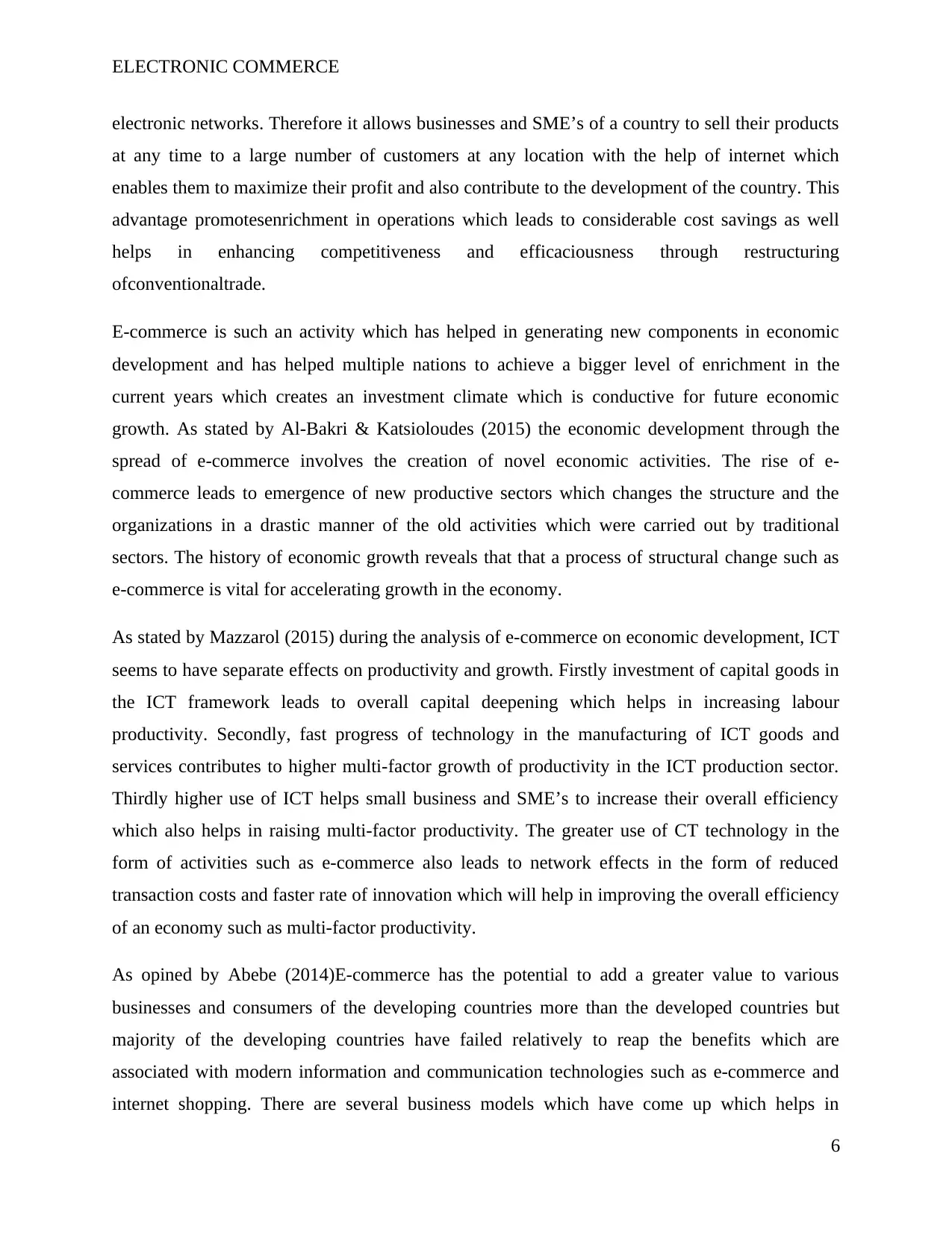
ELECTRONIC COMMERCE
electronic networks. Therefore it allows businesses and SME’s of a country to sell their products
at any time to a large number of customers at any location with the help of internet which
enables them to maximize their profit and also contribute to the development of the country. This
advantage promotesenrichment in operations which leads to considerable cost savings as well
helps in enhancing competitiveness and efficaciousness through restructuring
ofconventionaltrade.
E-commerce is such an activity which has helped in generating new components in economic
development and has helped multiple nations to achieve a bigger level of enrichment in the
current years which creates an investment climate which is conductive for future economic
growth. As stated by Al-Bakri & Katsioloudes (2015) the economic development through the
spread of e-commerce involves the creation of novel economic activities. The rise of e-
commerce leads to emergence of new productive sectors which changes the structure and the
organizations in a drastic manner of the old activities which were carried out by traditional
sectors. The history of economic growth reveals that that a process of structural change such as
e-commerce is vital for accelerating growth in the economy.
As stated by Mazzarol (2015) during the analysis of e-commerce on economic development, ICT
seems to have separate effects on productivity and growth. Firstly investment of capital goods in
the ICT framework leads to overall capital deepening which helps in increasing labour
productivity. Secondly, fast progress of technology in the manufacturing of ICT goods and
services contributes to higher multi-factor growth of productivity in the ICT production sector.
Thirdly higher use of ICT helps small business and SME’s to increase their overall efficiency
which also helps in raising multi-factor productivity. The greater use of CT technology in the
form of activities such as e-commerce also leads to network effects in the form of reduced
transaction costs and faster rate of innovation which will help in improving the overall efficiency
of an economy such as multi-factor productivity.
As opined by Abebe (2014)E-commerce has the potential to add a greater value to various
businesses and consumers of the developing countries more than the developed countries but
majority of the developing countries have failed relatively to reap the benefits which are
associated with modern information and communication technologies such as e-commerce and
internet shopping. There are several business models which have come up which helps in
6
electronic networks. Therefore it allows businesses and SME’s of a country to sell their products
at any time to a large number of customers at any location with the help of internet which
enables them to maximize their profit and also contribute to the development of the country. This
advantage promotesenrichment in operations which leads to considerable cost savings as well
helps in enhancing competitiveness and efficaciousness through restructuring
ofconventionaltrade.
E-commerce is such an activity which has helped in generating new components in economic
development and has helped multiple nations to achieve a bigger level of enrichment in the
current years which creates an investment climate which is conductive for future economic
growth. As stated by Al-Bakri & Katsioloudes (2015) the economic development through the
spread of e-commerce involves the creation of novel economic activities. The rise of e-
commerce leads to emergence of new productive sectors which changes the structure and the
organizations in a drastic manner of the old activities which were carried out by traditional
sectors. The history of economic growth reveals that that a process of structural change such as
e-commerce is vital for accelerating growth in the economy.
As stated by Mazzarol (2015) during the analysis of e-commerce on economic development, ICT
seems to have separate effects on productivity and growth. Firstly investment of capital goods in
the ICT framework leads to overall capital deepening which helps in increasing labour
productivity. Secondly, fast progress of technology in the manufacturing of ICT goods and
services contributes to higher multi-factor growth of productivity in the ICT production sector.
Thirdly higher use of ICT helps small business and SME’s to increase their overall efficiency
which also helps in raising multi-factor productivity. The greater use of CT technology in the
form of activities such as e-commerce also leads to network effects in the form of reduced
transaction costs and faster rate of innovation which will help in improving the overall efficiency
of an economy such as multi-factor productivity.
As opined by Abebe (2014)E-commerce has the potential to add a greater value to various
businesses and consumers of the developing countries more than the developed countries but
majority of the developing countries have failed relatively to reap the benefits which are
associated with modern information and communication technologies such as e-commerce and
internet shopping. There are several business models which have come up which helps in
6
⊘ This is a preview!⊘
Do you want full access?
Subscribe today to unlock all pages.

Trusted by 1+ million students worldwide
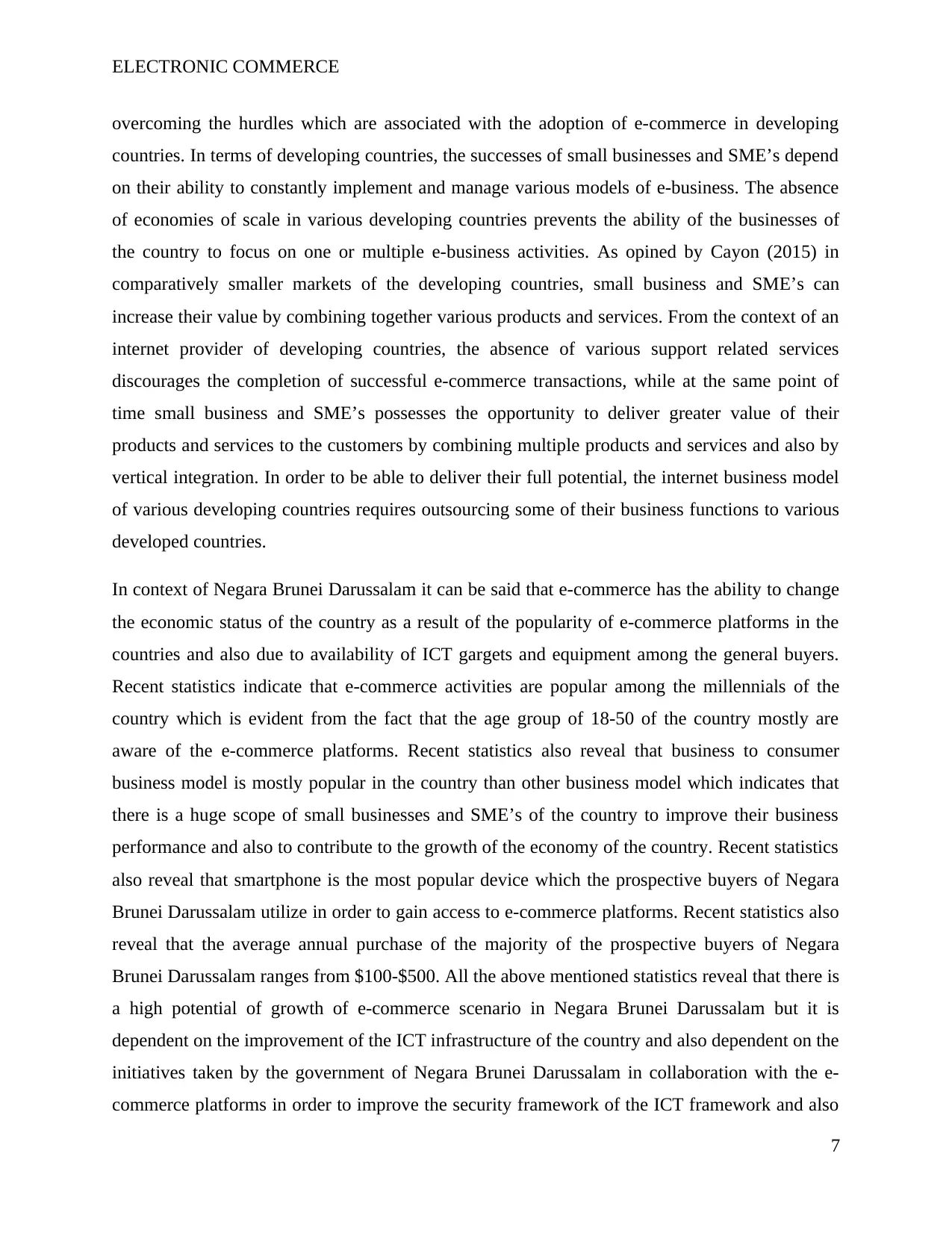
ELECTRONIC COMMERCE
overcoming the hurdles which are associated with the adoption of e-commerce in developing
countries. In terms of developing countries, the successes of small businesses and SME’s depend
on their ability to constantly implement and manage various models of e-business. The absence
of economies of scale in various developing countries prevents the ability of the businesses of
the country to focus on one or multiple e-business activities. As opined by Cayon (2015) in
comparatively smaller markets of the developing countries, small business and SME’s can
increase their value by combining together various products and services. From the context of an
internet provider of developing countries, the absence of various support related services
discourages the completion of successful e-commerce transactions, while at the same point of
time small business and SME’s possesses the opportunity to deliver greater value of their
products and services to the customers by combining multiple products and services and also by
vertical integration. In order to be able to deliver their full potential, the internet business model
of various developing countries requires outsourcing some of their business functions to various
developed countries.
In context of Negara Brunei Darussalam it can be said that e-commerce has the ability to change
the economic status of the country as a result of the popularity of e-commerce platforms in the
countries and also due to availability of ICT gargets and equipment among the general buyers.
Recent statistics indicate that e-commerce activities are popular among the millennials of the
country which is evident from the fact that the age group of 18-50 of the country mostly are
aware of the e-commerce platforms. Recent statistics also reveal that business to consumer
business model is mostly popular in the country than other business model which indicates that
there is a huge scope of small businesses and SME’s of the country to improve their business
performance and also to contribute to the growth of the economy of the country. Recent statistics
also reveal that smartphone is the most popular device which the prospective buyers of Negara
Brunei Darussalam utilize in order to gain access to e-commerce platforms. Recent statistics also
reveal that the average annual purchase of the majority of the prospective buyers of Negara
Brunei Darussalam ranges from $100-$500. All the above mentioned statistics reveal that there is
a high potential of growth of e-commerce scenario in Negara Brunei Darussalam but it is
dependent on the improvement of the ICT infrastructure of the country and also dependent on the
initiatives taken by the government of Negara Brunei Darussalam in collaboration with the e-
commerce platforms in order to improve the security framework of the ICT framework and also
7
overcoming the hurdles which are associated with the adoption of e-commerce in developing
countries. In terms of developing countries, the successes of small businesses and SME’s depend
on their ability to constantly implement and manage various models of e-business. The absence
of economies of scale in various developing countries prevents the ability of the businesses of
the country to focus on one or multiple e-business activities. As opined by Cayon (2015) in
comparatively smaller markets of the developing countries, small business and SME’s can
increase their value by combining together various products and services. From the context of an
internet provider of developing countries, the absence of various support related services
discourages the completion of successful e-commerce transactions, while at the same point of
time small business and SME’s possesses the opportunity to deliver greater value of their
products and services to the customers by combining multiple products and services and also by
vertical integration. In order to be able to deliver their full potential, the internet business model
of various developing countries requires outsourcing some of their business functions to various
developed countries.
In context of Negara Brunei Darussalam it can be said that e-commerce has the ability to change
the economic status of the country as a result of the popularity of e-commerce platforms in the
countries and also due to availability of ICT gargets and equipment among the general buyers.
Recent statistics indicate that e-commerce activities are popular among the millennials of the
country which is evident from the fact that the age group of 18-50 of the country mostly are
aware of the e-commerce platforms. Recent statistics also reveal that business to consumer
business model is mostly popular in the country than other business model which indicates that
there is a huge scope of small businesses and SME’s of the country to improve their business
performance and also to contribute to the growth of the economy of the country. Recent statistics
also reveal that smartphone is the most popular device which the prospective buyers of Negara
Brunei Darussalam utilize in order to gain access to e-commerce platforms. Recent statistics also
reveal that the average annual purchase of the majority of the prospective buyers of Negara
Brunei Darussalam ranges from $100-$500. All the above mentioned statistics reveal that there is
a high potential of growth of e-commerce scenario in Negara Brunei Darussalam but it is
dependent on the improvement of the ICT infrastructure of the country and also dependent on the
initiatives taken by the government of Negara Brunei Darussalam in collaboration with the e-
commerce platforms in order to improve the security framework of the ICT framework and also
7
Paraphrase This Document
Need a fresh take? Get an instant paraphrase of this document with our AI Paraphraser
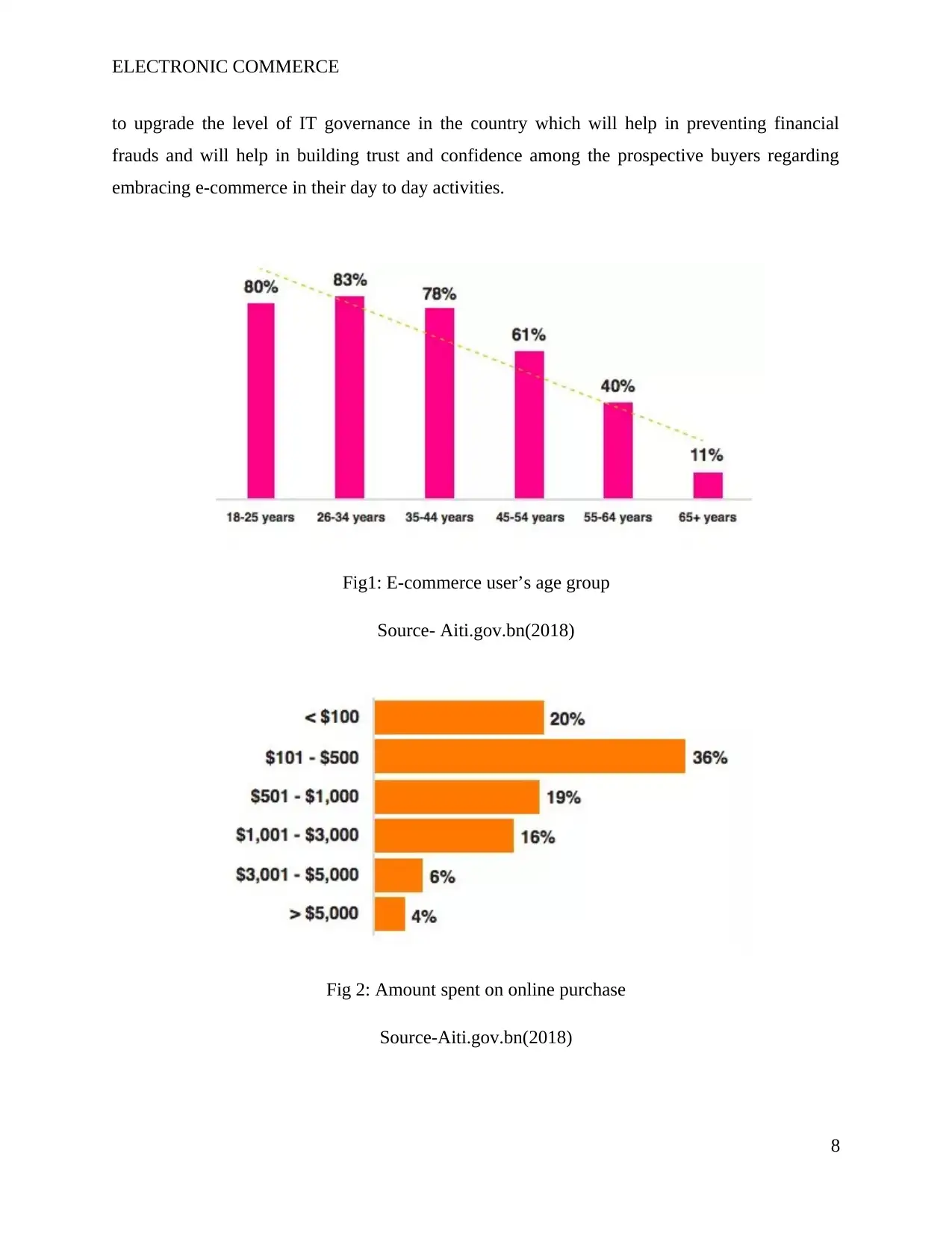
ELECTRONIC COMMERCE
to upgrade the level of IT governance in the country which will help in preventing financial
frauds and will help in building trust and confidence among the prospective buyers regarding
embracing e-commerce in their day to day activities.
Fig1: E-commerce user’s age group
Source- Aiti.gov.bn(2018)
Fig 2: Amount spent on online purchase
Source-Aiti.gov.bn(2018)
8
to upgrade the level of IT governance in the country which will help in preventing financial
frauds and will help in building trust and confidence among the prospective buyers regarding
embracing e-commerce in their day to day activities.
Fig1: E-commerce user’s age group
Source- Aiti.gov.bn(2018)
Fig 2: Amount spent on online purchase
Source-Aiti.gov.bn(2018)
8
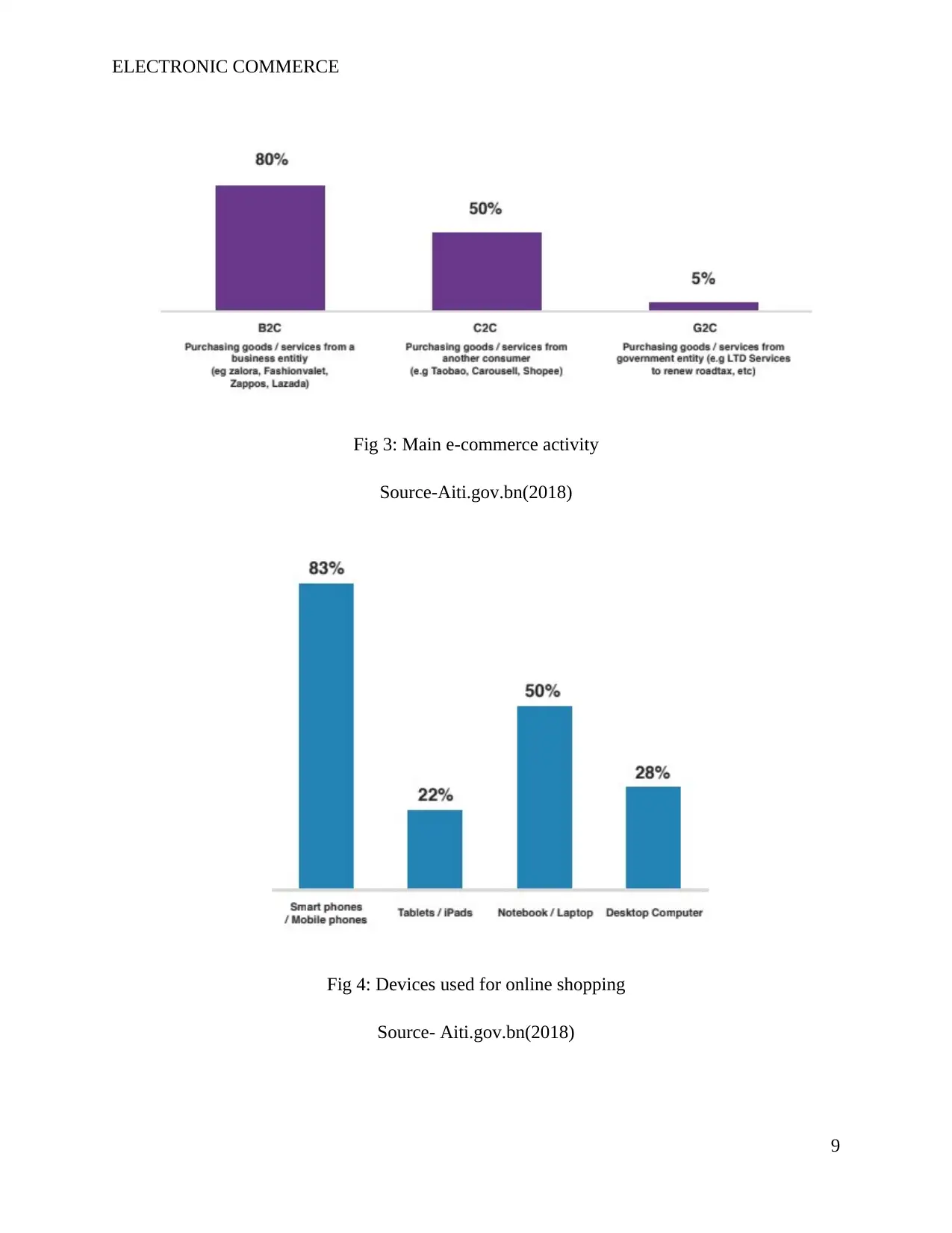
ELECTRONIC COMMERCE
Fig 3: Main e-commerce activity
Source-Aiti.gov.bn(2018)
Fig 4: Devices used for online shopping
Source- Aiti.gov.bn(2018)
9
Fig 3: Main e-commerce activity
Source-Aiti.gov.bn(2018)
Fig 4: Devices used for online shopping
Source- Aiti.gov.bn(2018)
9
⊘ This is a preview!⊘
Do you want full access?
Subscribe today to unlock all pages.

Trusted by 1+ million students worldwide
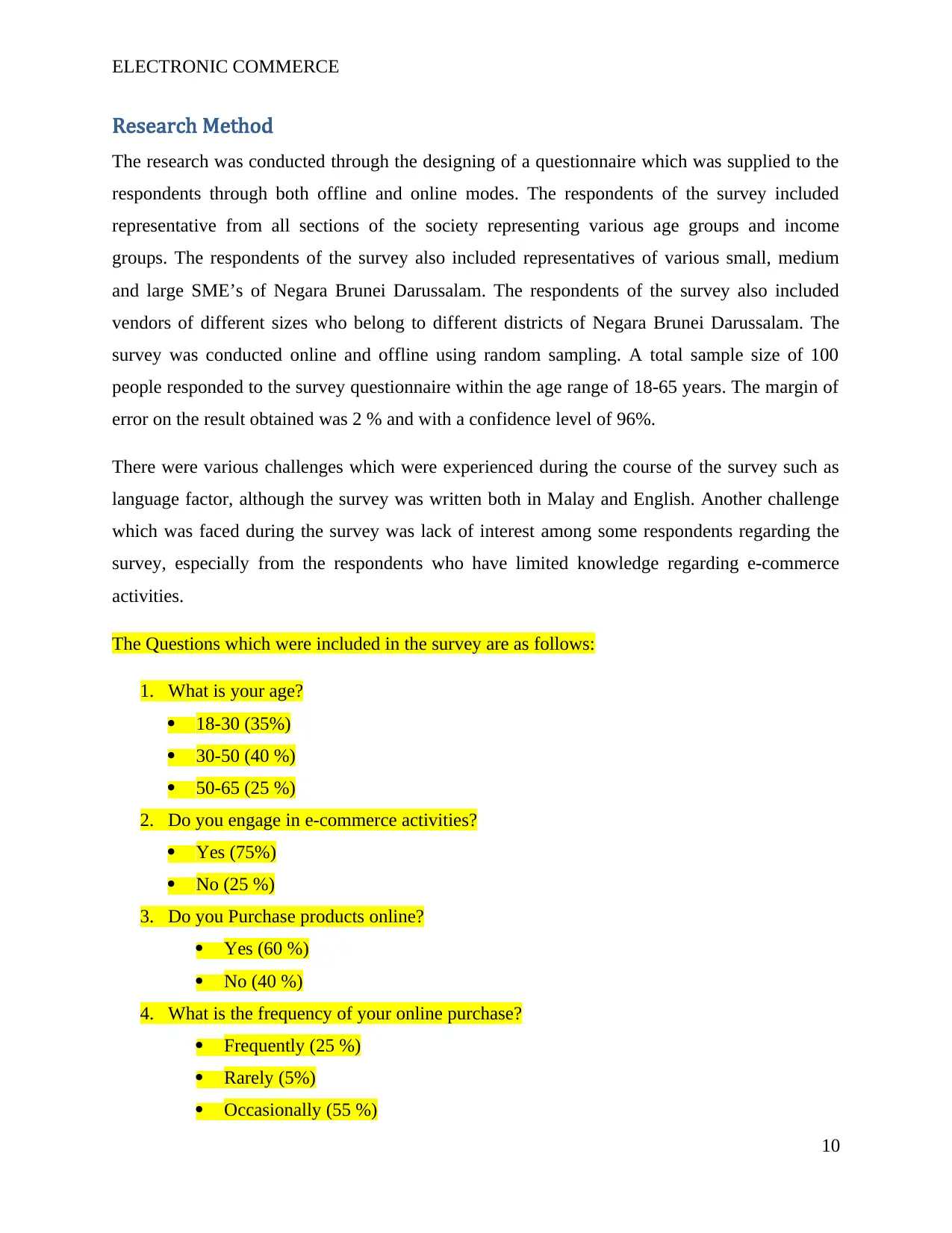
ELECTRONIC COMMERCE
Research Method
The research was conducted through the designing of a questionnaire which was supplied to the
respondents through both offline and online modes. The respondents of the survey included
representative from all sections of the society representing various age groups and income
groups. The respondents of the survey also included representatives of various small, medium
and large SME’s of Negara Brunei Darussalam. The respondents of the survey also included
vendors of different sizes who belong to different districts of Negara Brunei Darussalam. The
survey was conducted online and offline using random sampling. A total sample size of 100
people responded to the survey questionnaire within the age range of 18-65 years. The margin of
error on the result obtained was 2 % and with a confidence level of 96%.
There were various challenges which were experienced during the course of the survey such as
language factor, although the survey was written both in Malay and English. Another challenge
which was faced during the survey was lack of interest among some respondents regarding the
survey, especially from the respondents who have limited knowledge regarding e-commerce
activities.
The Questions which were included in the survey are as follows:
1. What is your age?
18-30 (35%)
30-50 (40 %)
50-65 (25 %)
2. Do you engage in e-commerce activities?
Yes (75%)
No (25 %)
3. Do you Purchase products online?
Yes (60 %)
No (40 %)
4. What is the frequency of your online purchase?
Frequently (25 %)
Rarely (5%)
Occasionally (55 %)
10
Research Method
The research was conducted through the designing of a questionnaire which was supplied to the
respondents through both offline and online modes. The respondents of the survey included
representative from all sections of the society representing various age groups and income
groups. The respondents of the survey also included representatives of various small, medium
and large SME’s of Negara Brunei Darussalam. The respondents of the survey also included
vendors of different sizes who belong to different districts of Negara Brunei Darussalam. The
survey was conducted online and offline using random sampling. A total sample size of 100
people responded to the survey questionnaire within the age range of 18-65 years. The margin of
error on the result obtained was 2 % and with a confidence level of 96%.
There were various challenges which were experienced during the course of the survey such as
language factor, although the survey was written both in Malay and English. Another challenge
which was faced during the survey was lack of interest among some respondents regarding the
survey, especially from the respondents who have limited knowledge regarding e-commerce
activities.
The Questions which were included in the survey are as follows:
1. What is your age?
18-30 (35%)
30-50 (40 %)
50-65 (25 %)
2. Do you engage in e-commerce activities?
Yes (75%)
No (25 %)
3. Do you Purchase products online?
Yes (60 %)
No (40 %)
4. What is the frequency of your online purchase?
Frequently (25 %)
Rarely (5%)
Occasionally (55 %)
10
Paraphrase This Document
Need a fresh take? Get an instant paraphrase of this document with our AI Paraphraser
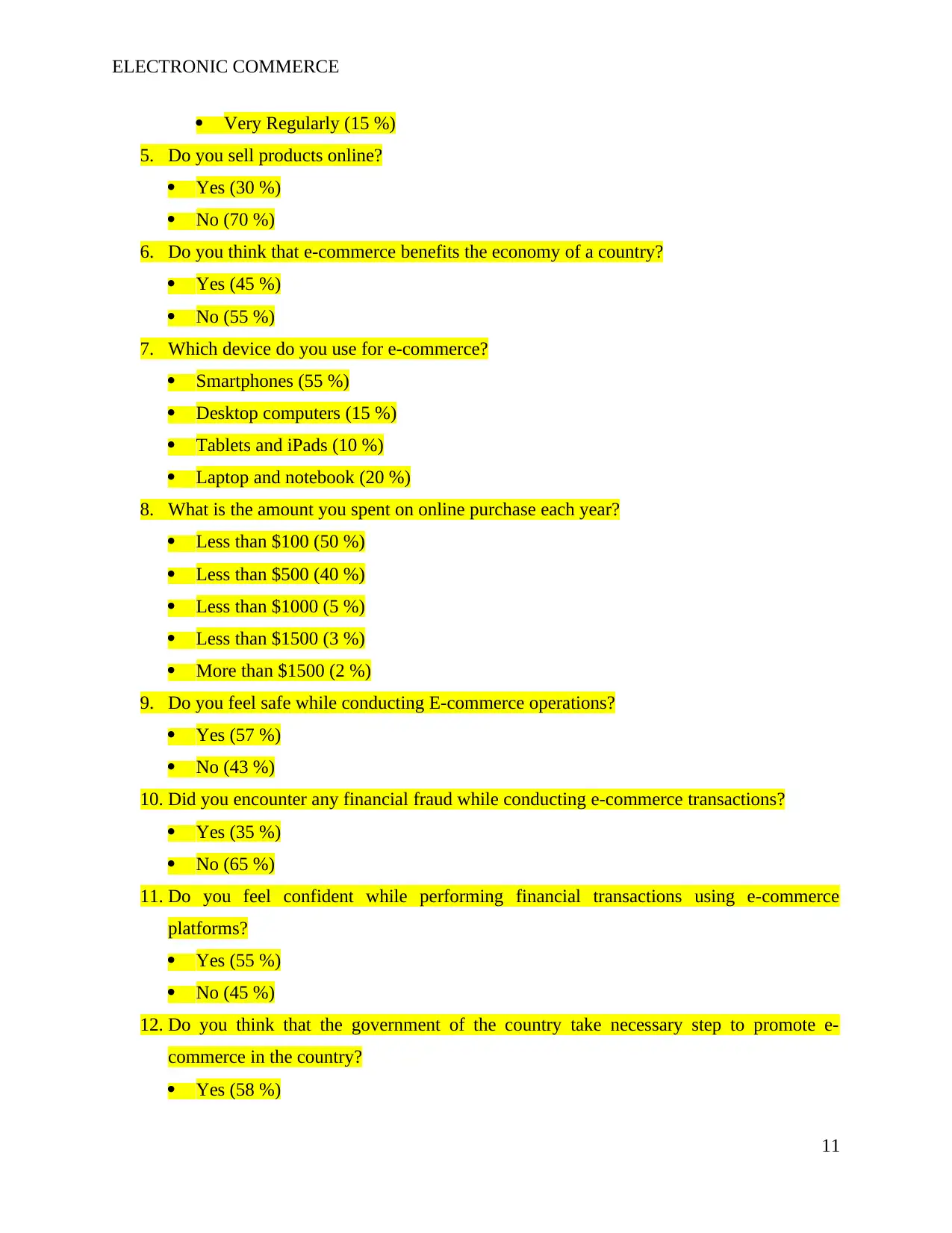
ELECTRONIC COMMERCE
Very Regularly (15 %)
5. Do you sell products online?
Yes (30 %)
No (70 %)
6. Do you think that e-commerce benefits the economy of a country?
Yes (45 %)
No (55 %)
7. Which device do you use for e-commerce?
Smartphones (55 %)
Desktop computers (15 %)
Tablets and iPads (10 %)
Laptop and notebook (20 %)
8. What is the amount you spent on online purchase each year?
Less than $100 (50 %)
Less than $500 (40 %)
Less than $1000 (5 %)
Less than $1500 (3 %)
More than $1500 (2 %)
9. Do you feel safe while conducting E-commerce operations?
Yes (57 %)
No (43 %)
10. Did you encounter any financial fraud while conducting e-commerce transactions?
Yes (35 %)
No (65 %)
11. Do you feel confident while performing financial transactions using e-commerce
platforms?
Yes (55 %)
No (45 %)
12. Do you think that the government of the country take necessary step to promote e-
commerce in the country?
Yes (58 %)
11
Very Regularly (15 %)
5. Do you sell products online?
Yes (30 %)
No (70 %)
6. Do you think that e-commerce benefits the economy of a country?
Yes (45 %)
No (55 %)
7. Which device do you use for e-commerce?
Smartphones (55 %)
Desktop computers (15 %)
Tablets and iPads (10 %)
Laptop and notebook (20 %)
8. What is the amount you spent on online purchase each year?
Less than $100 (50 %)
Less than $500 (40 %)
Less than $1000 (5 %)
Less than $1500 (3 %)
More than $1500 (2 %)
9. Do you feel safe while conducting E-commerce operations?
Yes (57 %)
No (43 %)
10. Did you encounter any financial fraud while conducting e-commerce transactions?
Yes (35 %)
No (65 %)
11. Do you feel confident while performing financial transactions using e-commerce
platforms?
Yes (55 %)
No (45 %)
12. Do you think that the government of the country take necessary step to promote e-
commerce in the country?
Yes (58 %)
11
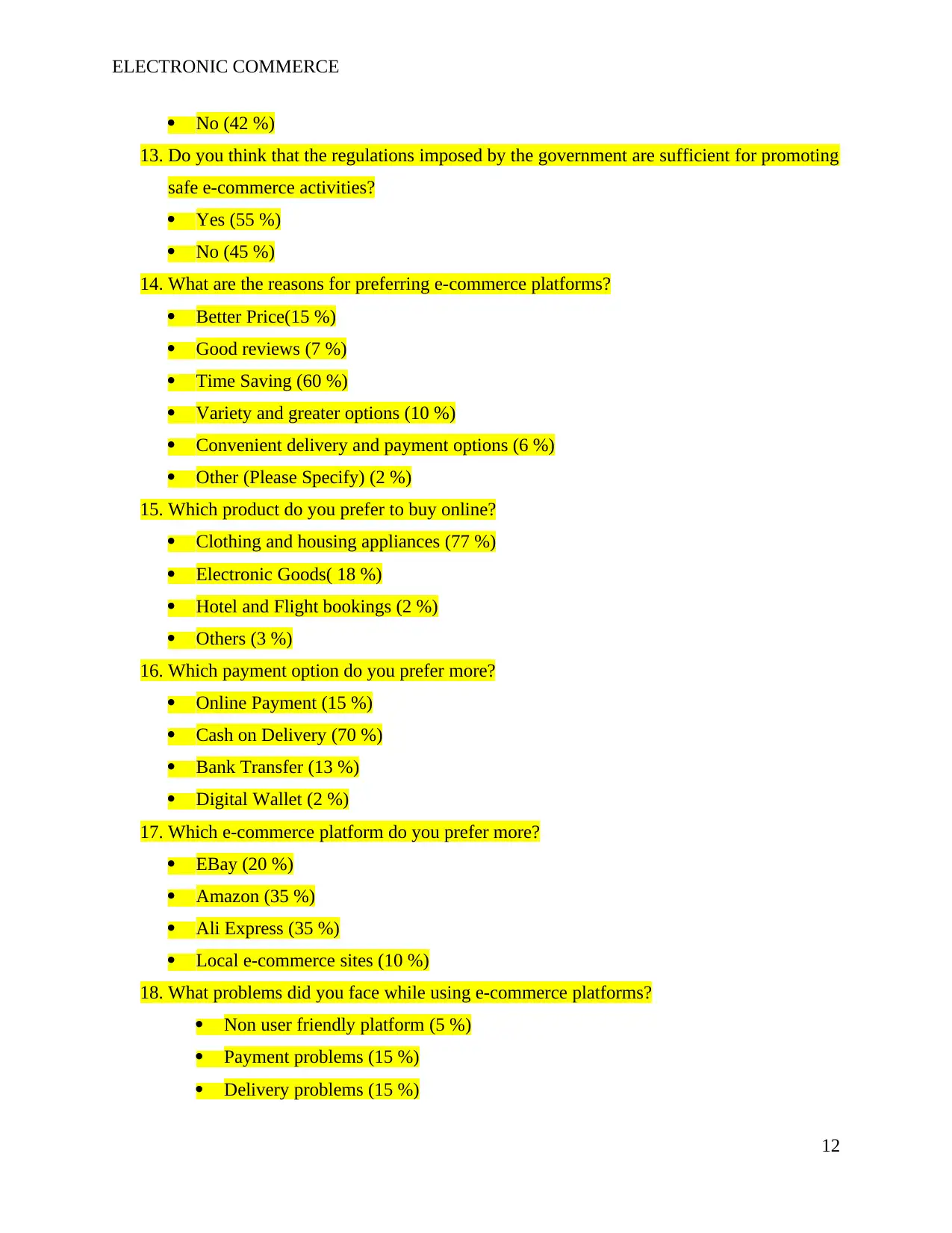
ELECTRONIC COMMERCE
No (42 %)
13. Do you think that the regulations imposed by the government are sufficient for promoting
safe e-commerce activities?
Yes (55 %)
No (45 %)
14. What are the reasons for preferring e-commerce platforms?
Better Price(15 %)
Good reviews (7 %)
Time Saving (60 %)
Variety and greater options (10 %)
Convenient delivery and payment options (6 %)
Other (Please Specify) (2 %)
15. Which product do you prefer to buy online?
Clothing and housing appliances (77 %)
Electronic Goods( 18 %)
Hotel and Flight bookings (2 %)
Others (3 %)
16. Which payment option do you prefer more?
Online Payment (15 %)
Cash on Delivery (70 %)
Bank Transfer (13 %)
Digital Wallet (2 %)
17. Which e-commerce platform do you prefer more?
EBay (20 %)
Amazon (35 %)
Ali Express (35 %)
Local e-commerce sites (10 %)
18. What problems did you face while using e-commerce platforms?
Non user friendly platform (5 %)
Payment problems (15 %)
Delivery problems (15 %)
12
No (42 %)
13. Do you think that the regulations imposed by the government are sufficient for promoting
safe e-commerce activities?
Yes (55 %)
No (45 %)
14. What are the reasons for preferring e-commerce platforms?
Better Price(15 %)
Good reviews (7 %)
Time Saving (60 %)
Variety and greater options (10 %)
Convenient delivery and payment options (6 %)
Other (Please Specify) (2 %)
15. Which product do you prefer to buy online?
Clothing and housing appliances (77 %)
Electronic Goods( 18 %)
Hotel and Flight bookings (2 %)
Others (3 %)
16. Which payment option do you prefer more?
Online Payment (15 %)
Cash on Delivery (70 %)
Bank Transfer (13 %)
Digital Wallet (2 %)
17. Which e-commerce platform do you prefer more?
EBay (20 %)
Amazon (35 %)
Ali Express (35 %)
Local e-commerce sites (10 %)
18. What problems did you face while using e-commerce platforms?
Non user friendly platform (5 %)
Payment problems (15 %)
Delivery problems (15 %)
12
⊘ This is a preview!⊘
Do you want full access?
Subscribe today to unlock all pages.

Trusted by 1+ million students worldwide
1 out of 26
Related Documents
Your All-in-One AI-Powered Toolkit for Academic Success.
+13062052269
info@desklib.com
Available 24*7 on WhatsApp / Email
![[object Object]](/_next/static/media/star-bottom.7253800d.svg)
Unlock your academic potential
Copyright © 2020–2026 A2Z Services. All Rights Reserved. Developed and managed by ZUCOL.





